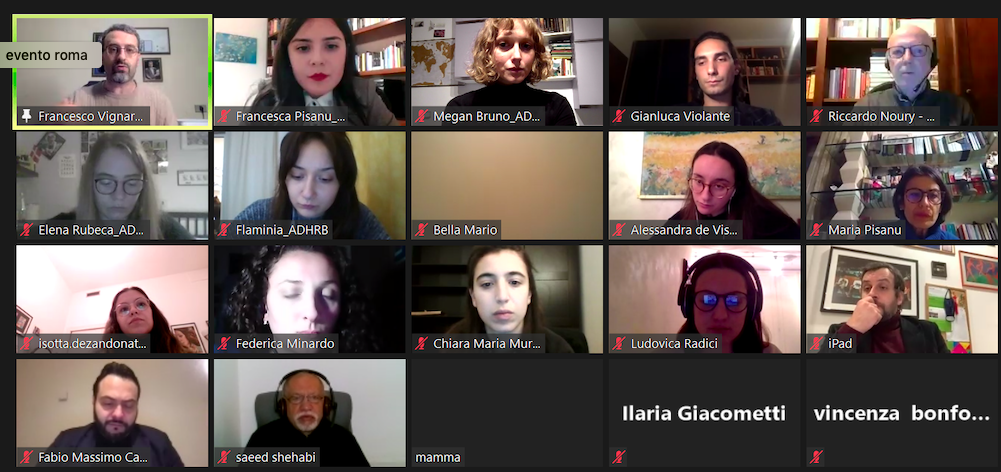Ten years after the beginning of the pro-democratic movements in the Gulf region, the Italian team of Americans for Democracy and Human Rights in Bahrain organized an event on the 17th of February to commemorate the demonstrations in Manama and to discuss the current human rights situation in the Gulf.
The webinar began with the testimony of Najah Youssef, a Bahraini activist who described the violence and retaliation that she and her family suffered due to their participation in the pro-democratic demonstrations of 2011. During the conference, four speakers took the floor: Francesca Pisanu, advocacy assistant at ADHRB, Riccardo Noury from Amnesty Italy, Francesco Vignarca of the ‘Rete Italiana Pace e Disarmo’ and Professor Francesco Cherubini of the University LUISS Guido Carli.
The event organized by ADHRB was unique, especially in a country such as Italy, where news media have paid closer attention to events in Egypt, Tunisia, and Libya than those in Bahrain. Such neglect may be due, as some of the speakers highlighted, to the fact that there was no direct western involvement in the uprisings. However, all the panelists stressed that the claims made by human rights and democracy advocates deserve special attention, considering that since the ‘Valentine’s day uprising’, Bahrain has been turned into a police state, in which all forms of dissent are repressed and human rights are violated by the government itself.
The speakers highlighted the peaceful nature of the demonstrations in Bahrain, characterized by strong demands on human and civil rights, and the central role of women in pushing for change. It should be remembered, as suggested by Riccardo Noury, the brutality with which dissent was suppressed by the Al-Khalifa regime, aided by direct military involvement of Saudi Arabia and the United Arab Emirates.
Furthermore, the speakers pointed out that some Western countries, including Italy, contribute to the whitewashing of such repressions by lending themselves to publicity stunt initiatives, such as the ‘King Hamad Chair for Religious Co-Existence’ at the University of Rome La Sapienza.
However, Italy’s support for undemocratic regimes is also evident in its commercial relations to the region: the country exports armaments to the Gulf for very high figures. In 2015, the value of exports to Kuwait was almost 8 billion, 6.5 billion to Qatar, 855 million to Saudi Arabia, and 65 million to Bahrain. Despite the recently implemented decision by the Italian parliament to suspend arms sales to Saudi Arabia and the United Arab Emirates, exports to other countries in the region continue. The Vice President of the European Parliament Castaldo and the MEP Pignedoli also pointed out that although clear criteria are governing the sale of weapons to third countries, including the respect for human rights, there are no sanctioning tools for those countries that violate these criteria.
A further issue regarding the human rights situation in the region is that governments have adhered to only a few international conventions, as Associate Professor Francesco Cherubini points out. Moreover, even in those instances in which countries do adhere, governments refuse to accept optional clauses of these conventions that would allow the UN Human Rights Council the authority of carrying out investigations and assessments, thus rendering the conventions themselves less effective.
Despite these limitations, the panelists stressed the importance that activism plays in promoting human rights and peace in the region, and ADHRB took the opportunity to officially call for the release of the leader of the political opposition in Bahrain, Hassan Mushaima, who was arrested and sentenced for life due to his political dissent.





